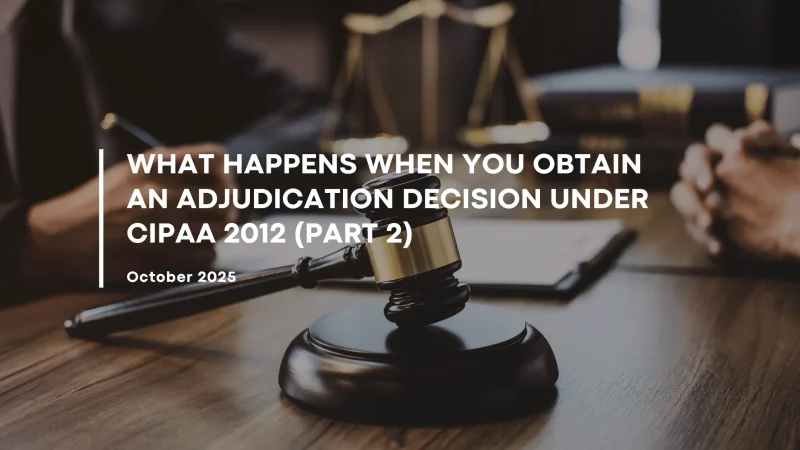Are you contending construction project disagreements? Deciding between arbitration or litigation? At PD Legal, our firm sees all too often our clients wrangling over construction disputes that can stall projects, drain finances, and bring about avoidable stress. Knowing your rights under the law as well as the available options is vital, and arbitration in Singapore frequently presents the faster, more efficient alternative when compared to litigation.
What Is a Construction Dispute?
A construction dispute occurs when parties involved in a project such as developers, contractors, or suppliers disagree over obligations or performance under a contract.
Common causes include:
- Delays in project timelines
- Unpaid invoices or escalating costs
- Disagreements over work quality or materials
- Contract breaches or changes in scope
Understanding these disputes early can help prevent small issues from escalating into legal battles.
What Is Arbitration and How Does It Work in Construction Disputes?
Arbitration is a private dispute resolution method where an independent arbitrator, rather than a court, decides the outcome. It is legally binding and recognized under Singapore law.
Here’s how it typically works:
- Both parties agree to settle disputes through arbitration (often stated in their contract).
- An arbitrator or panel is appointed.
- Each side presents evidence and arguments.
- The arbitrator delivers a binding decision, known as an award.
Arbitration in Singapore is often conducted under the Singapore International Arbitration Centre (SIAC), known for efficiency and impartiality in commercial disputes.
Litigation vs. Arbitration in Singapore: What’s the Difference?
Understanding the difference between litigation vs arbitration is important:
- Litigation: Court proceedings, public hearings, and rigid procedures.
- Arbitration: Private process, flexible procedures, and specialized decision-makers.
While litigation can provide strong enforcement powers, arbitration often reduces delays, costs, and potential damage to professional relationships.
What Are Your Legal Rights in Construction Disputes?
Under Singapore law, parties to a construction contract have several key rights:
- The right to claim unpaid amounts for completed work
- The right to enforce contract terms when breached
- The right to seek compensation for defects or project delays
Understanding these rights allows you to negotiate from a stronger position, and to decide whether arbitration or litigation is more appropriate for your situation.
Why Should You Hire a Lawyer for a Construction Dispute?
Construction law in Singapore can be complex. Engaging a construction dispute lawyer ensures your rights and obligations are properly represented throughout the arbitration or litigation process.
A qualified lawyer can:
- Review contracts and identify breaches
- Advise on the most effective dispute resolution method
- Represent you in arbitration proceedings
- Ensure compliance with the Arbitration Act and procedural rules
Having legal counsel helps you avoid costly mistakes and achieve fair outcomes faster.
Why Is Arbitration Often Preferred in Construction Disputes?
Many parties in Singapore’s construction industry choose arbitration because it:
- Delivers faster resolutions than court trials
- Keeps proceedings confidential, protecting business reputation
- Allows technical experts to act as arbitrators
- Offers enforceable awards recognized internationally
Arbitration provides a balance of flexibility, privacy, and efficiency which is crucial for maintaining professional relationships while resolving disputes effectively.
How Does Arbitration Work Specifically in Singapore?
Singapore is a global hub for arbitration, supported by modern infrastructure and strong legal frameworks. Most cases follow rules set by the SIAC or under the Arbitration Act 2001.
Key advantages of arbitration in Singapore include:
- Access to experienced construction arbitrators
- Neutral and well-respected legal environment
- Enforcement of awards under the New York Convention
- Support from the Singapore courts when needed
These factors make Singapore one of the most trusted venues for resolving construction and commercial disputes.
How Can You Prepare for Arbitration in a Construction Dispute?
Before starting arbitration, you should:
- Review your contract’s dispute resolution clause
- Gather all relevant documents, invoices, and correspondence
- Consult a lawyer familiar with construction arbitration
- Agree on procedural rules and an arbitrator with the other party
Preparation helps ensure the process runs efficiently and that your arguments are supported by clear evidence.
Why PD Legal is Your Partner in Resolving Construction Disputes
At PD Legal, we focus on helping clients understand the complexities of construction disputes and their legal rights under Singaporean law. Our team of experienced lawyers in Singapore guides parties through arbitration, ensuring procedures are followed correctly and efficiently. By combining legal expertise with practical solutions, we help clients navigate disputes and reach fair, timely resolutions.
Conclusion
Resolving construction disputes can be complex, but arbitration often offers a quicker, more flexible, and private alternative to court proceedings. Understanding your legal rights can make the process smoother and more effective.
At PD Legal, our lawyers in Singapore guide clients through arbitration, protecting their legal rights under the law. If you are facing a construction dispute, reach out to us and get the guidance you need!
FAQs
Arbitration in Singapore involves parties agreeing to resolve disputes outside court with an independent arbitrator. Construction disputes are presented to the arbitrator, who makes a binding decision under Singapore law, protecting the legal rights of all parties.
Arbitration in the construction industry is a method to resolve construction disputes without going through lengthy court procedures. A lawyer in Singapore often guides clients to ensure their legal rights are preserved during the arbitration process.
Singapore is popular for arbitration due to its strong legal framework, experienced lawyers, and transparent enforcement of decisions. The country’s arbitration system provides efficiency and certainty for resolving complex construction disputes.
The biggest problem of arbitration can be the cost and complexity of proceedings, especially for large construction disputes. Even with an experienced lawyer in Singapore, parties may face challenges in enforcing decisions under the law.
The five steps of arbitration include initiating the dispute, appointing an arbitrator, presenting evidence, conducting hearings, and issuing the decision. A lawyer can guide parties through these steps to ensure legal rights are protected in construction disputes.
Costs for arbitration are typically shared between parties based on agreements or the arbitrator’s ruling. Hiring a lawyer in Singapore may add to expenses, but ensures legal rights are fully considered during construction disputes.
Arbitration is private, flexible, and often faster, while court proceedings are public, formal, and can take longer. Both protect legal rights, but arbitration allows lawyers to present disputes with more focus on technical aspects of construction.
While parties can represent themselves, hiring a lawyer in Singapore ensures legal rights are protected and procedures are correctly followed. Lawyers play a crucial role in presenting evidence and arguments in construction disputes.
Arbitration can be cheaper than court for certain construction disputes due to faster resolution and less formal procedures. Costs still depend on the complexity of the dispute and involvement of a lawyer in Singapore.
Parties seeking faster, private, and specialized resolution benefit the most from arbitration. Construction disputes are efficiently resolved while preserving legal rights with the guidance of a lawyer in Singapore.
The outcome of arbitration depends on the evidence and arguments presented by each party. A lawyer ensures legal rights are properly argued, which increases the chance of a favorable result in construction disputes.
Matters involving criminal offenses, certain regulatory violations, or public law issues cannot be settled by arbitration. Construction disputes and contractual disagreements remain suitable for arbitration with guidance from a lawyer in Singapore.
Settling a construction dispute may save time and cost, but arbitration provides a binding decision under Singapore law. Consulting a lawyer in Singapore helps assess whether arbitration or settlement better protects your legal rights.
Disclaimer: This article is intended to provide general information only and does not constitute legal advice. It should not be used as a substitute for professional legal consultation. We recommend seeking legal advice before making any decisions based on the information in this article. PDLegal fully disclaims any responsibility for any loss or damage that may result from reliance on this article.

